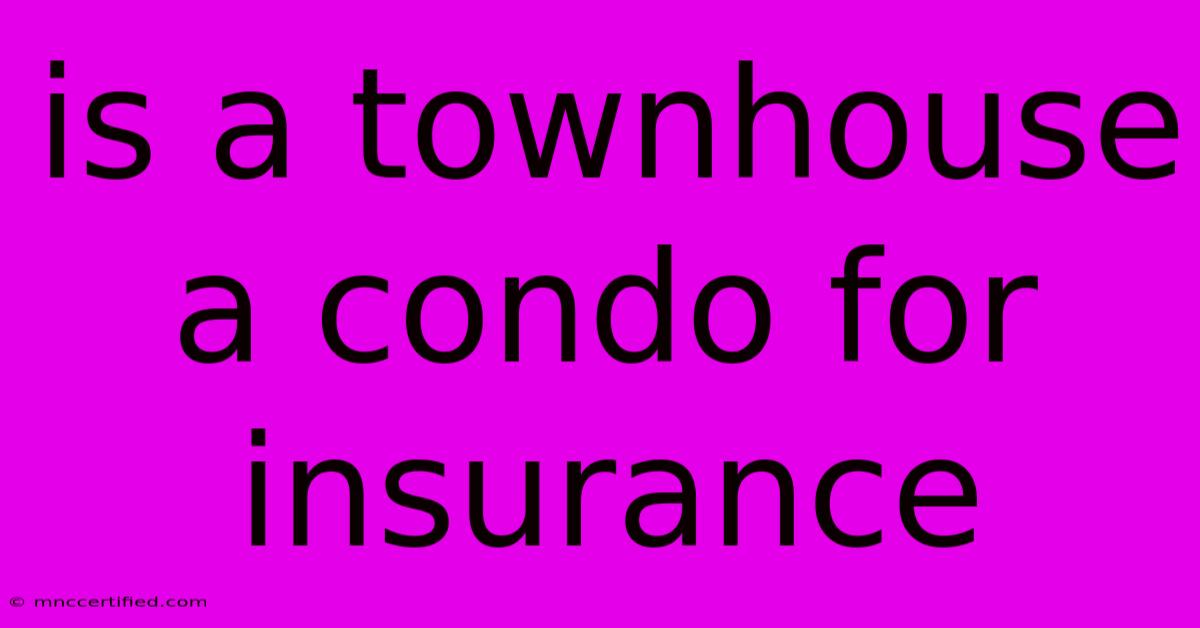Is A Townhouse A Condo For Insurance

Table of Contents
Is a Townhouse a Condo for Insurance? Navigating the Confusing World of Homeownership
When purchasing a home, many buyers find themselves caught between the appeal of townhouses and condominiums. Both offer unique benefits, but one key difference lies in insurance coverage. The question arises: is a townhouse considered a condo for insurance purposes? The answer, unfortunately, is not always straightforward.
Understanding the Differences: Townhouses vs. Condos
To understand how insurance treats townhouses, let's define these dwelling types:
Townhouses:
- Shared walls: Townhouses share at least one common wall with neighboring units.
- Individual ownership: Owners typically hold individual title to their unit and the land underneath it.
- Limited common areas: Townhouses usually have shared areas like driveways, landscaping, and exterior maintenance, but these are typically managed by the homeowners' association (HOA).
Condominiums:
- Shared walls: Condominiums share walls with all surrounding units.
- Ownership of unit only: Condo owners only own their interior space, with the exterior, land, and common areas managed by the HOA.
- Extensive common areas: Condos often feature extensive shared amenities like pools, fitness centers, and parking garages.
The Insurance Dilemma: Townhouses vs. Condos
The distinction between townhouses and condos becomes crucial when it comes to insurance. Here's why:
Condo Insurance:
- Focus on the interior: Condo insurance primarily covers the interior of your unit, including personal property and any structural damage to your owned space.
- HOA coverage: The HOA typically carries a master policy covering common areas, liability, and major building repairs.
Townhouse Insurance:
- Coverage for the entire structure: Townhouse insurance usually covers both the interior and exterior of your unit, including the land it sits on.
- HOA coverage: While some HOA's may provide basic coverage, homeowners typically carry more comprehensive insurance policies for their individual units.
The Gray Area:
The problem lies in the fact that some townhouses are actually considered condominiums under insurance policies. This happens because the HOA may hold ownership of the entire complex, including the land and individual units. In such cases, you'll need a condo insurance policy, even though you might technically own the land your townhouse sits on.
How to Determine Your Townhouse's Insurance Needs
- Review your HOA documents: Check your governing documents carefully for language that specifies ownership and responsibility.
- Speak to your HOA: Ask them directly about the insurance structure and whether the HOA carries master coverage.
- Consult an insurance agent: Share your HOA documents and ask for an expert assessment. They can determine the appropriate policy for your townhouse, be it condo insurance or traditional homeowner's insurance.
Remember: A simple "townhouse" label doesn't automatically dictate your insurance needs. It's essential to delve deeper into the legal and ownership structure of your specific community to make informed decisions about your insurance coverage.
Key Takeaways:
- Townhouses and condos differ in ownership and responsibility for common areas.
- Townhouses may be considered condos for insurance purposes if the HOA holds ownership of the entire property.
- Always consult your HOA documents, speak with the HOA management, and consult with an insurance agent to determine your specific insurance needs.
By taking the time to understand the nuanced differences between townhouses and condos, you can make informed decisions about your insurance coverage and protect your investment in your new home.

Thank you for visiting our website wich cover about Is A Townhouse A Condo For Insurance. We hope the information provided has been useful to you. Feel free to contact us if you have any questions or need further assistance. See you next time and dont miss to bookmark.
Featured Posts
-
Is The Rolex 16613 A Good Investment
Nov 12, 2024
-
Composite Resin Bonding Front Teeth
Nov 12, 2024
-
Blox Fruit Trading Value Win Or Lose
Nov 12, 2024
-
Zeldin Named Trumps Epa Chief
Nov 12, 2024
-
Stefanik Selected As Trumps Un Ambassador
Nov 12, 2024